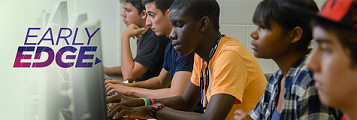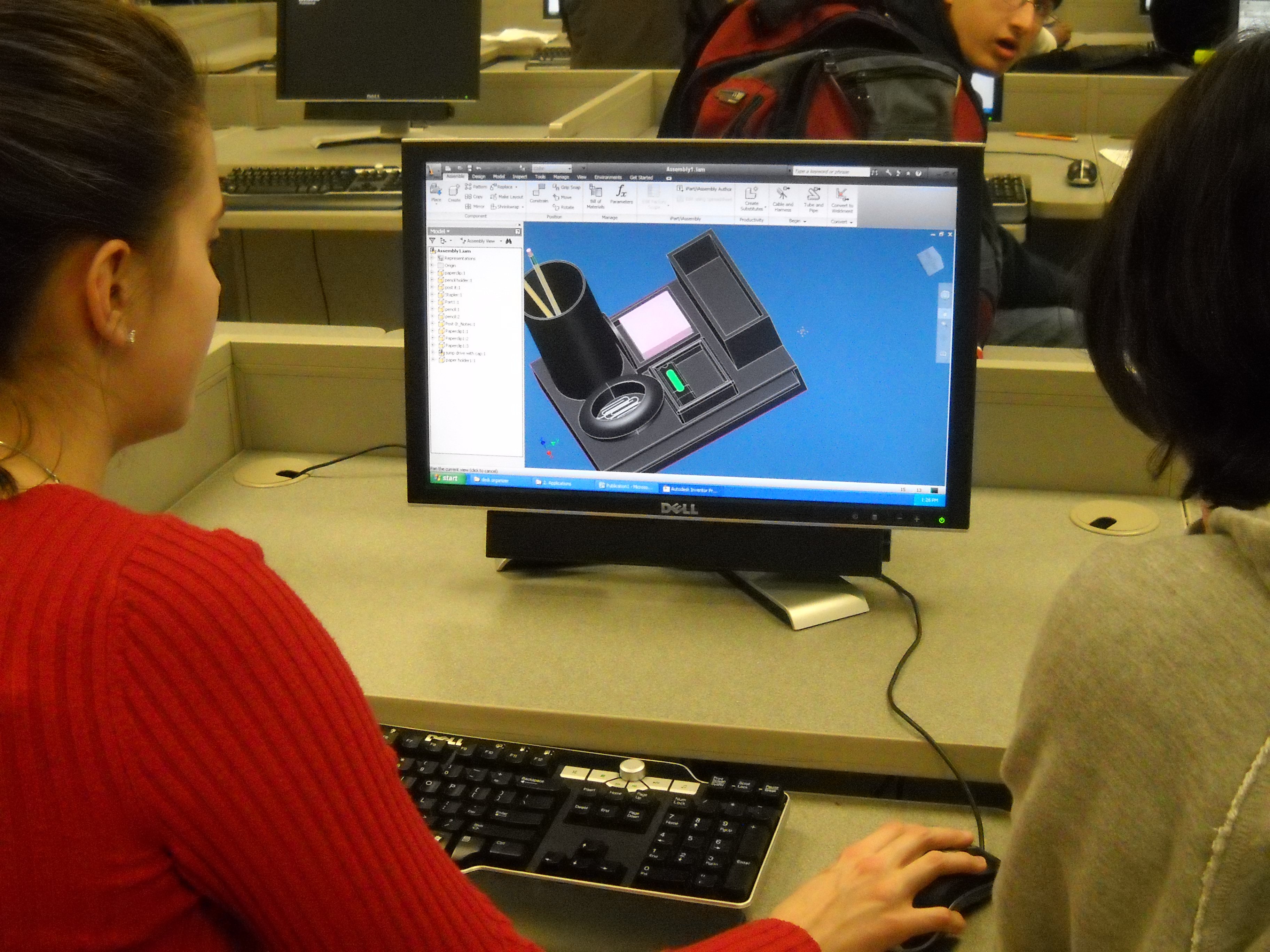Technology Education
|
|
|
Department Phone: 240-740-0448
|
||
| Mr. Everett Brown | Ms. Erin Burrell | Mr. Kevin Koperski |
| Ms. Cassandra Laine | Mr. Moshe Milstein | Mr. Johny Sozi |
Early Edge
 |
Montgomery County Public Schools has developed a three-year action plan in response to a 2017 external review, Preparing All Students for Economic and Career Success, conducted by the Education Strategy Group. The plan was developed by a group of stakeholders that included parents, current and former students, staff, and business, community, and higher education leaders.
Profiles of Success
These MCPS graduates in successful careers all have one thing in common: they took career readiness courses that gave them an early edge through experience and education. Read and watch their stories.
Pathways available at B-CC
The 21st century requires us to be prepared for an ever changing world. Bethesda-Chevy Chase High School is committed to ensure that every student will have access to a "Early Edge" program and enter the world college and career ready. The B-CC Career and Technology Education Department offers five pathways and a internship program. Furthermore, students may apply to Montgomery College for Dual Enrollment credit as part of some of these pathways. AP courses may also allow students to potentially earn college credit . Each of these pathways meet the Maryland State requirement as a Program of Study (POS) for graduation or can be taken as focused areas of study during your four years at B-CC. Furthermore, these programs support us as an IB MYP and IB Diploma school. There are many benefits in completing a pathway, as they allow you to get a head start toward your future. Some pathways will allow you to receive industry certification, and are recognized in the professional workforce.
Technology Education Courses
There is a technology class well suited for all students. Students must complete a year of one of our foundational technology classes to earn their technology credit for graduation and after that we have many advanced level technology courses to enhance our students in the field of technology. If a student is using one of the above Pathways to meet their Elective Graduation requirement they may have to take an additional Technology course to fulfill this requirement.
Foundations of Computer Science
This course is a part of the MSDE-approved 4-credit Program of Studies in Computer Science. The course provides an engaging introduction to computing concepts through a nationally-developed curriculum, offered through a unique partnership with Code.org. The course focuses on the conceptual ideas of computing so that students understand why tools and languages are used to solve problems through a study of human computer interaction, problem solving, web design, programming, data analysis, and robotics.
Introduction to Engineering Design (Project Lead the Way) (Prerequisite completion of Algebra 1 with a C or better)

AP Computer Science Principles
This course, offered in partnership with Code.org, advances student understanding of the central ideas of computer science, engaging students in activities that show how computing changes the world. Through a focus on creativity, students explore technology as a means for solving computational problems, examining computer science's relevance to and impact on the world today. Aligned to the new AP test of the same name, this course is part of an MSDE-approved 4-credit Program of Studies in Computer Science.
Project Lead The Way (PTLW) Advanced Engineering Courses
Introduction to Engineering Design (Project Lead the Way) (Prerequisite completion of Algebra 1 with a C or better)
An introductory course which develops student problem solving skills with emphasis placed on the development of three-dimensional solid models. Students will work from sketching simple geometric shapes to apply a solid modeling computer software package. They will learn a problem solving design process and how it is used in industry to manufacture a product. The Computer Aided Design System (CAD) will also be used to analyze and evaluate the product design. The techniques learned, and equipment used, is state of the art and is currently being used by engineers throughout the United States.
Upon completion of this course with a 85% B or better and a 6 or higher on the PTLW end of course assessment students are eligible to apply for 3 college credits through Rochester Institute of Technology.
Updated Collge Credit Information for 2019-2020 School Year
Aerospace Engineering
The fields of aeronautics and aerospace engineering are the focus of this engaging course that includes topics of study, such as aerospace information systems, astronautics, rocketry, propulsion, the biology and physics of space science, principles of aeronautics, structures and materials, and systems engineering. Students continue using the national Project Lead The Way (PLTW) model to develop solutions to aerospace problems through the application of engineering, mathematics, and science related knowledge.
Principles of Engineering
This is a broad-based survey course to help students understand engineering and engineering technology and identify career possibilities. This course provides an overview of engineering and engineering technology. Students develop problem-solving skills by tackling real-world engineering problems. Through theory and practical hands-on experiences, students address the emerging social and political consequences of technological change.
Upon completion of this course with a 85% B or better and a 6 or higher on the PTLW end of course assessment students are eligible to apply for 3 college credits through Rochester Institute of Technology.
Digital Electronics
This course introduces students to applied digital logic, a key element of careers in engineering and engineering technology. Students explore the smart circuits found in watches, calculators, video games, and computers. Students use industry-standard computer software to test and analyze digital circuitry. They design circuits to solve problems and use appropriate components to build their designs. Students use mathematics and science in solving real-world engineering problems.
Engineering Design and Development
This is the capstone course for the Project Lead The Way (PLTW) advanced engineering program. At the end of the course, teams present their research papers and defend their projects to a panel of engineers, business leaders, and engineering college educators for a professional review and feedback. This course equips students with the independent study skills that they will need in postsecondary education and careers in engineering and engineering technology.
Computer Science Courses:
Foundations of Computer Science A/B
This course is a part of the MSDE-approved 4-credit Program of Studies in Computer Science. The course provides an engaging introduction to computing concepts through a nationally-developed curriculum, offered through a unique partnership with Code.org. The course focuses on the conceptual ideas of computing so that students understand why tools and languages are used to solve problems through a study of human computer interaction, problem solving, web design, programming, data analysis, and robotics.
AP Computer Science Principles
This course, offered in partnership with Code.org, advances student understanding of the central ideas of computer science, engaging students in activities that show how computing changes the world. Through a focus on creativity, students explore technology as a means for solving computational problems, examining computer science's relevance to and impact on the world today. Aligned to the new AP test of the same name, this course is part of an MSDE-approved 4-credit Program of Studies in Computer Science.
Programming 1
This course introduces the basic principles of structured programming, within the context of an object-oriented language. Topics covered include fundamentals of programming language, simple and structured data types, control statements, functions, arrays, and classes. Emphasis is placed on developing effective problem-solving techniques through individual and team projects.
AP Computer Science Java
This course serves as an introduction to the Java programming language. Students learn the basic principles of object oriented programming including issues such as class design, inheritance, dynamic binding and interfaces. At the completion of this class the students will understand and be able to implement intermediate Java programming techniques in order to independently develop complex applications using the Java language. This class provides an extensive review of all the concepts covered on the College Board’s Advanced Computer Science examination. Students that complete this class will be fully prepared, and are expected to take the Computer Science examination.
Students will also learn how create basic games using Applets. An applet is a special kind of Java program that is embedded inside a web-page and runs in the context of the browser.
Web Design
This course begins with students creating web sites using basic html code. From there, the students are introduced to Dreamweaver. The Dreamweaver software is used to create exciting web sites with brilliant color, images, and interactivity. Students will also use the Fireworks software to enhance the images created for their web sites.
Flash is introduced during the last quarter of this class. Flash is the most popular animation tool used by web designers. Students start out by creating basic animated graphics, and eventually move developing full animated scenes.
